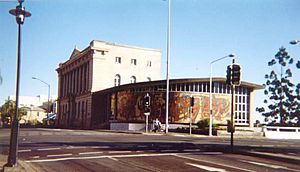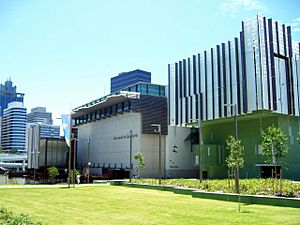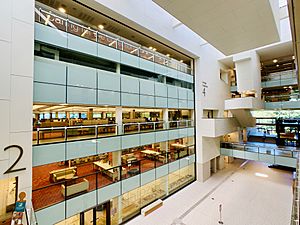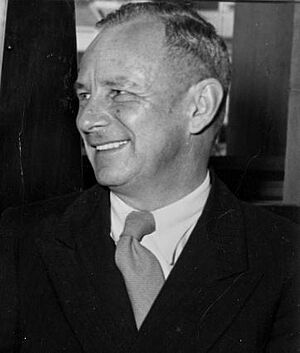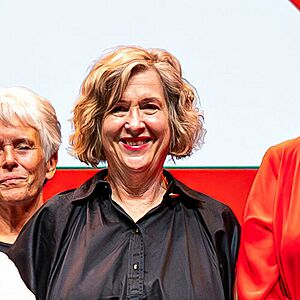State Library of Queensland facts for kids
Quick facts for kids State Library of Queensland |
|
|---|---|
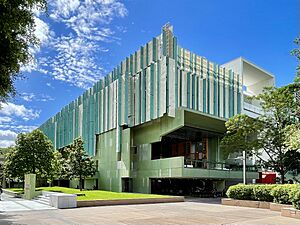 |
|
| The State Library building in South Brisbane | |
| Country | Australia |
| Type | State library |
| Established | 1896 |
| Location | South Brisbane, Queensland |
The State Library of Queensland is a super important library in Queensland, Australia. It's like a giant public library and research center run by the state government. A special group called the Library Board of Queensland makes sure it runs smoothly, following rules from the Libraries Act 1988.
Its main jobs are to collect and keep safe Queensland's history and culture. It also gives everyone in Queensland free access to information and helps other public libraries get better. You can find the State Library at Kurilpa Point, right by the Brisbane River at South Bank. It's part of the Queensland Cultural Centre.
Contents
A Look Back: History of the Library
The library started as the Brisbane Public Library in 1896. It was set up by the government of the Queensland Colony. In 1898, its name changed to the Public Library of Queensland. It first opened its doors to the public in 1902.
The John Oxley Library
In 1934, a special part of the library opened called the Oxley Memorial Library. It was named after the explorer John Oxley. This section was created for people to research and study things specifically about Queensland. Today, it's known as the John Oxley Library.
In 1943, the Libraries Act created the Library Board of Queensland. This board took over running the Public Library of Queensland. A few years later, it also started managing the Oxley Memorial Library.
New Ideas and Growth
In 1947, James L. Stapleton became Queensland's first State Librarian. He believed the library needed a new building. He also thought that library services should be free for everyone.
In 1971, the "Public Library" officially became the "State Library." The next year, a new service started to help local public libraries across Queensland. They even offered money to libraries that hired trained staff.
Later, the Country Lending Service began. It helped smaller public libraries by exchanging books and offering other services. This service is still going strong today, now called Rural Libraries Queensland.
In 1988, the State Library moved from its old building in William Street to its current spot. This new home is in the Queensland Cultural Centre in South Brisbane.
Helping Indigenous Communities
In 2003, the State Library started a new project. They began setting up Indigenous Knowledge Centres (IKCs) in places like Cape York and the Torres Strait. Now, there are 22 IKCs in remote and regional communities. You can find them across Cape York, the Torres Strait islands, Central Queensland, and at Cherbourg.
Modern Upgrades
Between 2006 and 2009, the library building got a big makeover. They added a fifth floor, a large new section facing the river, and a new entrance. In 2010, a nearby building called "The Edge" became part of the library. It's now used for workshops, creative activities, events, and exhibitions.
In 2011, the library shared 50,000 pictures with Wikimedia Commons. This made many historical images available for everyone to use. In 2022, the State Library celebrated its 120th birthday!
The Library's Design: Architecture
The Brisbane Public Library first moved into the Old State Library Building in William Street in 1899. This building used to house the Queensland Museum.
The library originally shared the building with an art gallery. In the late 1950s, an extension was built to create more space. This extension featured a unique tiled mural by Lindsay Edward on its outside. This mural won a national competition in 1958.
Moving to South Bank
In 1988, the State Library of Queensland moved to its new home. This was during the year of Brisbane's World Expo 88. The new building is in the Queensland Cultural Centre at South Bank. It's close to the Queensland Museum and the original Queensland Art Gallery.
This new building was designed by Robin Gibson and Partners. It was a C-shaped building made of concrete and glass. It was built around a large Poinciana tree that overlooks the Brisbane River.
A Big Renovation
In 2004, a major project called the Millennium Library Project began. This was a huge redevelopment of the existing State Library building. After three years of hard work, the South Bank building officially reopened on November 25, 2006.
Brisbane architecture firms Donovan Hill and Peddle Thorp led this big renovation. Their work won several awards, including the RAIA Sir Zelman Cowen Award for Public Architecture in 2007. This award recognized it as the best public building in Australia.
The changes by Donovan Hill and Peddle Thorp completely transformed the library. They redesigned the entrance, added another level, and doubled its size. The building is now seen as an "open, generous knowledge place." It's also called one of Australia's "most cherished public living rooms."
The library building faces the Brisbane River. It overlooks Stanley Place, which is between the Queensland Art Gallery and the Queensland Gallery of Modern Art.
What You Can Find: Collections and Services
The State Library has many different collections. These include books, journals, magazines, newspapers, and audio-visual items. You can also find resources for family history, maps, music, and electronic resources. There are special research collections, like the John Oxley Library and the Australian Library of Art.
Important Collections
The State Library holds seven very important collections. These are recognized by UNESCO's Australian Memory of the World Register:
- Margaret Lawrie Collection of Torres Strait Islands, 1964–1998
- Manifesto of the Queensland Labour Party, 1892
- The Convict Records of Queensland, 1825–1842
- James Tyson Papers, 1834–1965
- Anzac Day Commemoration Committee, 1916–1922
- The Johnstone Gallery Archive, 1948–1992
- Dr Barbara Piscitelli AM Children's Art Archive 1986–2016; 2020
The library also has many important collections that show Queensland's history:
- Materials related to Queensland elections, like websites, posters, and how-to-vote cards.
- The Frank and Eunice Corley House Photographs Collection. This has over 60,000 photos of Brisbane suburbs.
- The Richard Stringer Architectural Photography Archive. This includes over 63,000 photo negatives and about 100,000 digital images. It shows Queensland's buildings from 1967 to 2021.
Services for Everyone
The State Library offers many helpful services:
- You can access its collections, including 50,000 copyright-free Queensland images on Wikimedia Commons.
- It provides books and other materials to public libraries all over Queensland.
- It offers special services to public libraries, especially for young people and diverse communities.
- The library hosts public programs and exhibitions. It also lends exhibitions to schools and museums.
- It runs outreach programs across Queensland. These teach people about research, internet use, and digitisation.
- It provides library services to Aboriginal people and Torres Strait Islanders. This includes setting up Indigenous Knowledge Centres.
- There's a digital makerspace called The Edge, where you can create things.
- The kuril dhagun Indigenous Knowledge Centre is a special place for Indigenous culture and knowledge.
- The Corner is an activity area for children under 8, their parents, and educators.
- You can use a free 'Ask a Librarian' service to get help with your questions.
Exciting Exhibitions
The library has hosted many interesting exhibitions over the years. Some past exhibitions include:
- 100 not out: a century of Queensland sporting memories (2002)
- A Few of our Favourite Things (2006–2007)
- Bold but Faithful: John Oxley Library at work (2009)
- Transforming Tindale (2012)
- Hot Modernism (2014)
- Islands: hidden histories from Queensland Islands (2018–2019)
- Home: A Suburban Obsession (2018–2019)
- Plantation Voices (2019)
- Legacy: Reflections on Mabo (2022)
- Working Country (2023–2024)
- Purpose Built: Architecture for a better tomorrow (2023–2024)
Take a Tour
You can take free guided tours of the library building to learn more about it.
Rural Libraries Queensland
Rural Libraries Queensland is a partnership between the State Library and about 30 local councils. Together, they provide library services to communities in rural areas.
National edeposit (NED)
The State Library is part of a group called National and State Libraries Australia. They helped create the National edeposit (NED) system. This system lets publishers from all over Australia upload electronic books and other publications. These can then be accessed online through Trove, depending on the access rules.
How the Library is Run
The Library Board of Queensland manages the State Library. This board gets its authority from the Libraries Act 1988.
State Librarians
The State Librarian is also the Chief Executive Officer of the library. Here are some of the people who have held this important role:
- James L. Stapleton, 1947–1970 (the longest-serving State Librarian)
- Sydney Lawrence (Lawrie) Ryan, 1970–1988
- Des Stephens, 1988–2001
- Lea Giles-Peters, 2001–2011 (the first woman to be appointed to this position)
- Janette Wright, 2012–2015
- Vicki McDonald AM FALIA, 2016–present
Awards and Fellowships
Queensland Business Leaders Hall of Fame
In 2009, the State Library of Queensland, the Queensland Library Foundation, and QUT Business School started the Queensland Business Leaders Hall of Fame. This initiative celebrates organizations, companies, and people who have made big contributions to Queensland's economy and society.
Each year, a committee chooses new members for the Hall of Fame. They look for things like strong leadership, major financial contributions, and pioneering work. Since 2014, they have also given out an annual fellowship. This helps researchers use the John Oxley Library's resources to learn new things about Queensland's business history.
Queensland Memory Awards
The Queensland Memory Awards celebrate people and groups who help document, save, and share Queensland's history. These awards include fellowships that support researchers and artists. They use the important collections of the John Oxley Library to create new insights into Queensland's past.
John Oxley Library Awards
The John Oxley Library Awards recognize amazing work by individuals and organizations. These awards honor those who help document, preserve, and improve our understanding of Queensland’s cultural heritage. Some well-known past winners include Robert (Uncle Bob) Anderson, Jackie Huggins, and Richard Stringer.
black&write! Writing Fellowships
Two black&write! Writing Fellowships are given out each year to Aboriginal and/or Torres Strait Islander writers. These fellowships are for writers living anywhere in Australia who have unpublished stories. Each winner receives a $15,000 cash prize. They also get help developing their writing with the black&write! team. Plus, they have a chance for their work to be published by the University of Queensland Press. Many talented writers have received these fellowships since 2011.
Other Fellowships
The library offers other fellowships to support researchers and creative people. These fellowships help them explore the John Oxley Library's collections. By working closely with these collections, they discover new information and share fresh perspectives on Queensland's history.
The main fellowship is the John Oxley Library Fellowship, which has been awarded since 2004. Other fellowships focus on specific historical topics, such as:
- Monica Clare Research Fellowship (for First Nations history)
- Rainbow Research Fellowship (for LGBTIQA+ history)
- Queensland Heritage Register Fellowship (for built heritage)
- Queensland Business Leaders Hall of Fame Fellowship (for business and economic history)
- Digital collections catalyst (for using digital collections and data)
- Christina Boughen OAM Fellowship (for using the Robert Boughen OBE and Christina Boughen OAM Collection)
- Letty Katts Fellowship (for music history)
- Royal Queensland Show (Ekka) Fellowship
The results of these research projects are often shared on the John Oxley Library blog.
 | Laphonza Butler |
 | Daisy Bates |
 | Elizabeth Piper Ensley |


